10 Best Cities for Remote Tech Workers
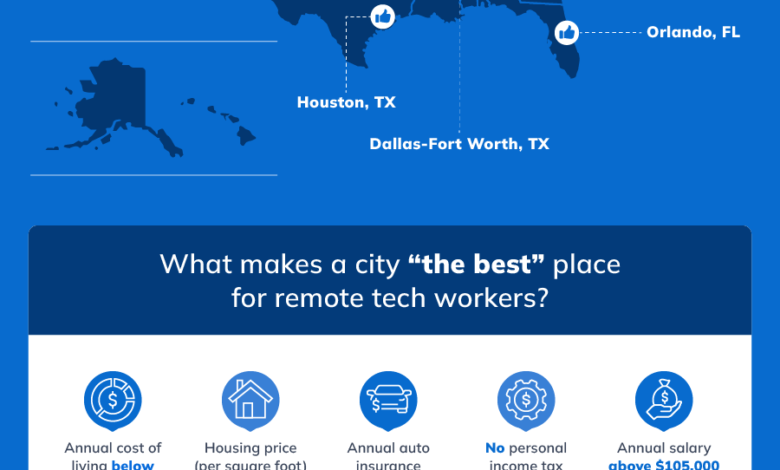
[ad_1]
With so many tech professionals working from home these days, it’s no longer a job requirement to live in a major tech hub. Salaries are portable, and many employees are free to relocate. But where should they go? TechRepublic has the answers.
Whether the goal is stretching that tech salary, striking the perfect work-life balance or getting ready to raise a family, TechRepublic’s first Best Cities for Remote Tech Workers has it covered. The report examined more than 1,000 data points in 13 categories to single out 60 potential cities for remote technology staffers. TechRepublic ranked these cities to determine where salaries go further and tech workers can enjoy a higher quality of life. Here is how they stacked up.
10 best cities for remote tech workers
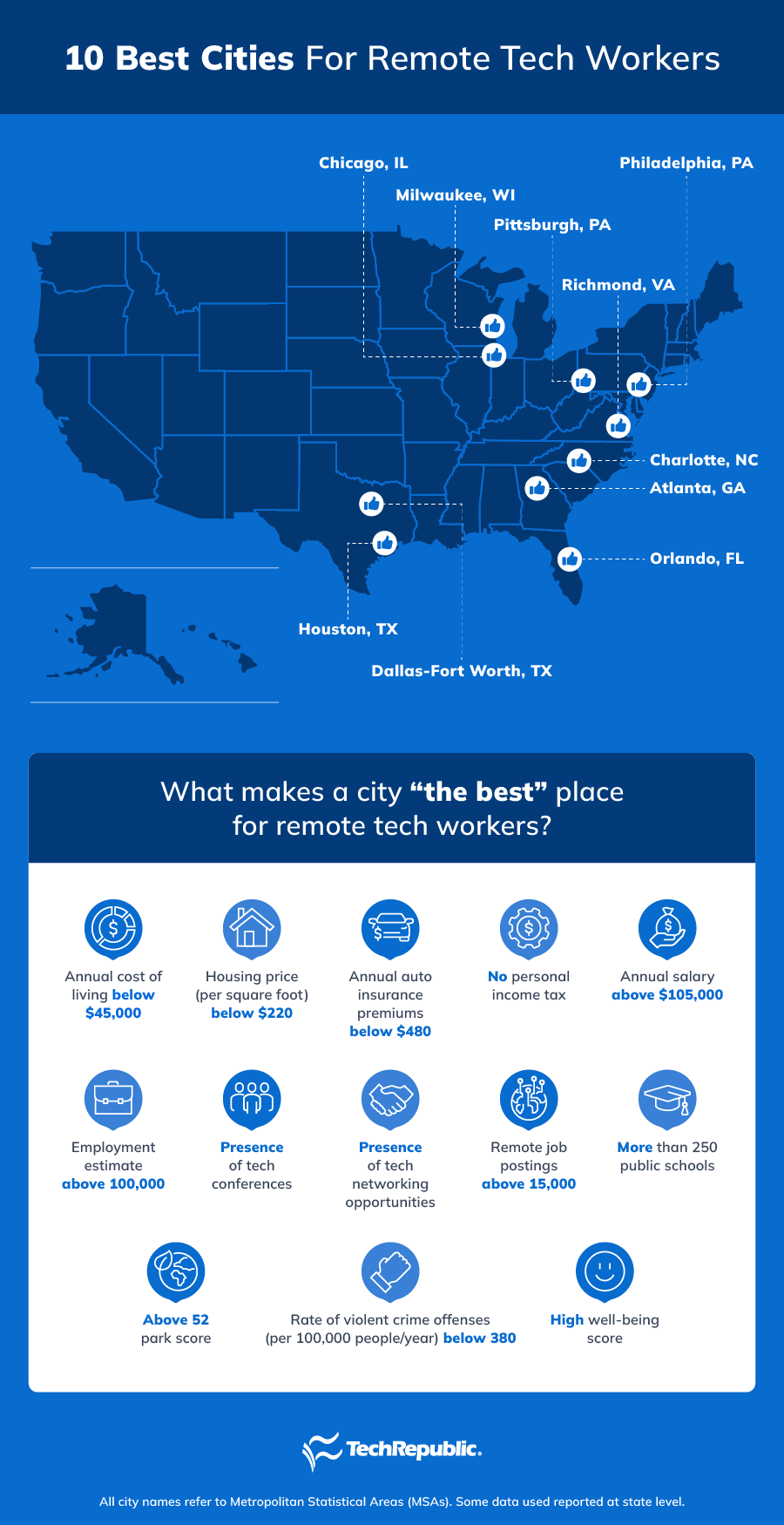
To understand all the information used to conduct TechRepublic’s analysis, see the complete data set and rankings.
10. Orlando, FL
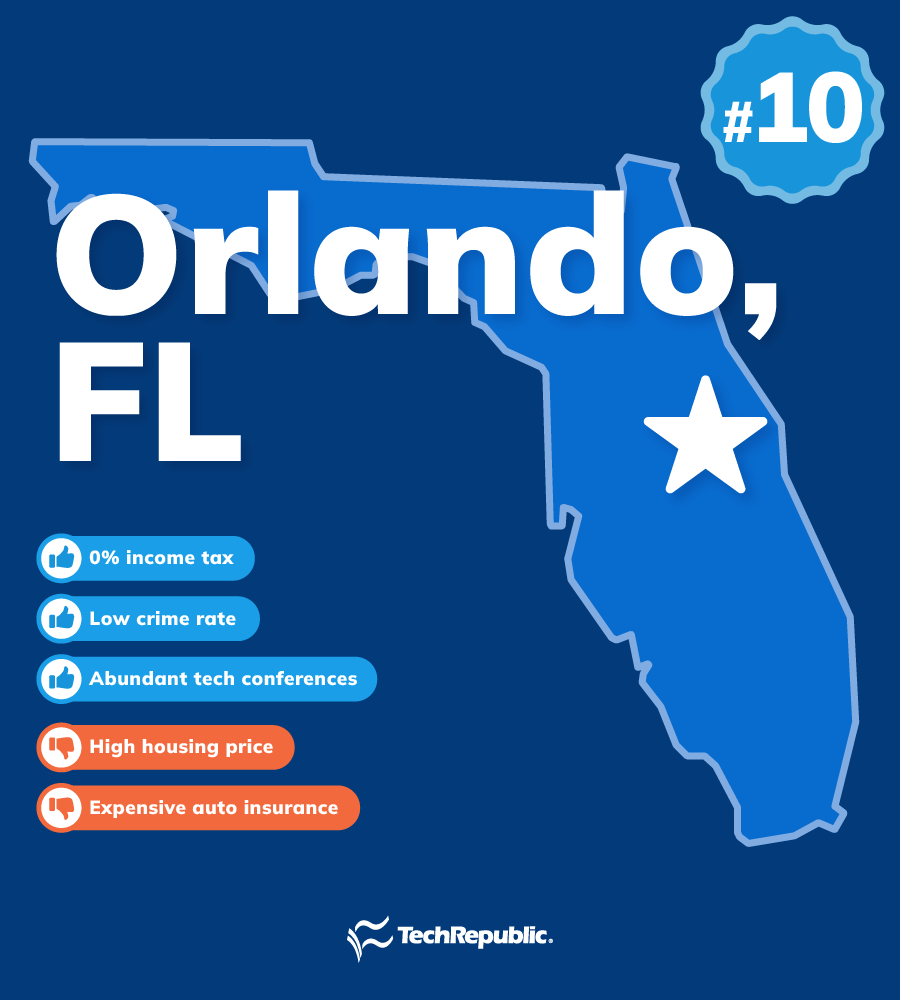
Rankings out of 60 U.S. metro areas
- Overall rank: 10
- Affordability: 29
- Job competitiveness: 24
- Quality of life: 4
To find the #10 city on TechRepublic’s list, head down to the Land of Mickey Mouse. Who wants to spend much time at home with all there is to see and do here? From hitting up the theme parks to taking a stroll through the 303 beautifully landscaped public parks, tech remote workers will surely find the vibrant outdoors of Orlando amusing.
Tech professionals’ salaries in the Sunshine State, amounting to $75,305, stretch further thanks to a 0% personal income tax.
Another great benefit of residing in the Orlando area is the proximity to national and international trade shows and conferences. Orlando hosts large events, such as:
- IEEE IAS Petroleum and Chemical Industry Technical Conference (PCIC).
- IEEE 32nd Annual International Symposium on Field-Programmable Custom Computing Machines (FCCM).
- IEEE International Performance, Computing, and Communications Conference (IPCCC).
For families, the educational outlook is good. Orlando boasts 292 public schools and another 214 private schools. Residents also enjoy safety and security. Florida has a lower-than-average rate of violent crime offenses at 258.9 per 100,000, according to the FBI.
That’s not to say everything is outstanding in Orlando. Yes, the cost of living is on the lower end but housing prices ranked 39th, with $238 per square foot. What’s more, auto insurance in Florida costs around $1,092.
9. Atlanta, GA
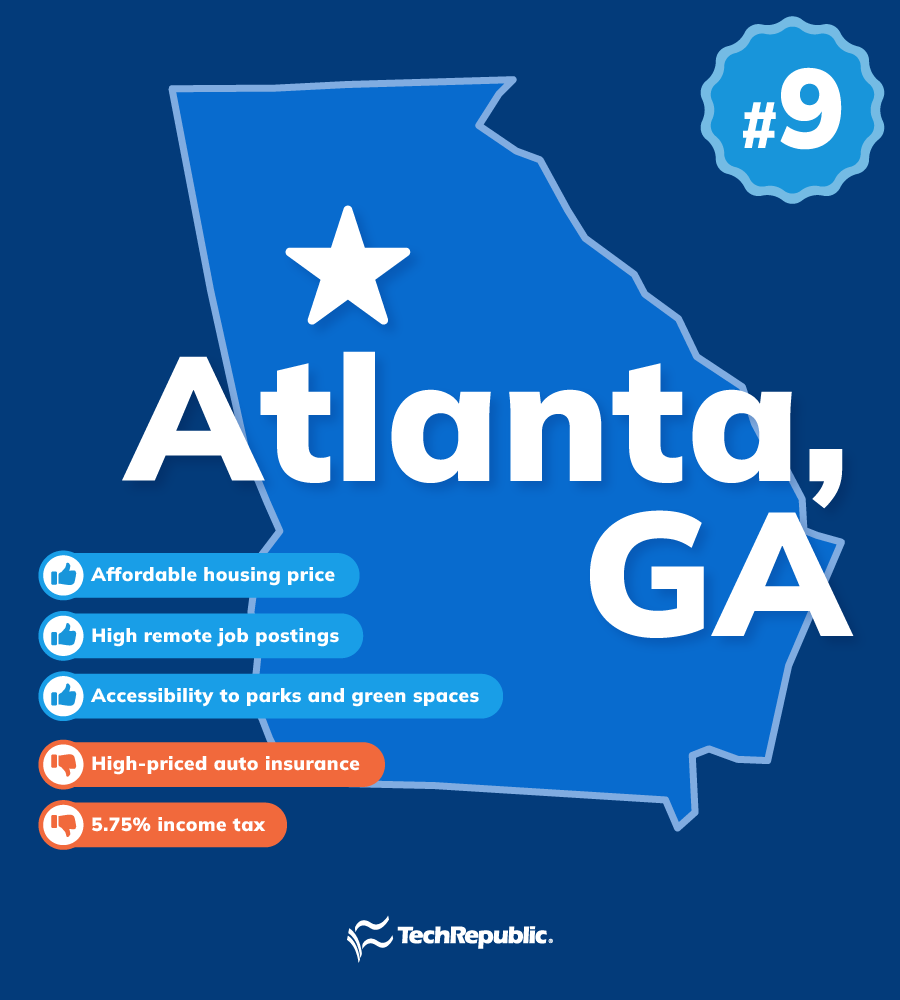
Rankings out of 60 U.S. metro areas
- Overall rank: 9
- Affordability: 29
- Job competitiveness: 14
- Quality of life: 12
The Big Peach comes in at #9 on our list. A remote tech worker’s dream of buying a home could be within reach, as the Atlanta metro area has an average housing cost of just $196 per square foot.
The average salary for a tech professional in Georgia is roughly $85,090 per year. With a lower-than-average cost of living in the Atlanta metro, tech workers could achieve financial gain.
Tech workers can also find a rich source of employment opportunities in the Silicon Peach. The employment estimate is around 124,540. As of this writing, around 20,000 remote tech jobs are posted on ZipRecruiter in the Atlanta Proper. For workers seeking face-to-face interactions, the city hosts a number of tech conferences such as:
- SoutheastCon 2024.
- SC24: International Conference for High Performance Computing, Networking, Storage and Analysis.
- IEEE Applied Power Electronics Conference and Exposition (APEC).
The great news is that the Greater Atlanta Area is conducive to work-life balance. After long hours of screen time, residents can simply step out of their homes and take a walk at one of more than 400 parks and green spaces in the metro area.
A flip side to living in Georgia is the taxes associated with huge salaries. Tech workers may not fully enjoy the hard-earned salary because of the 5.75% personal income tax. On top of that, auto insurance costs around $624 annually.
8. Charlotte, NC
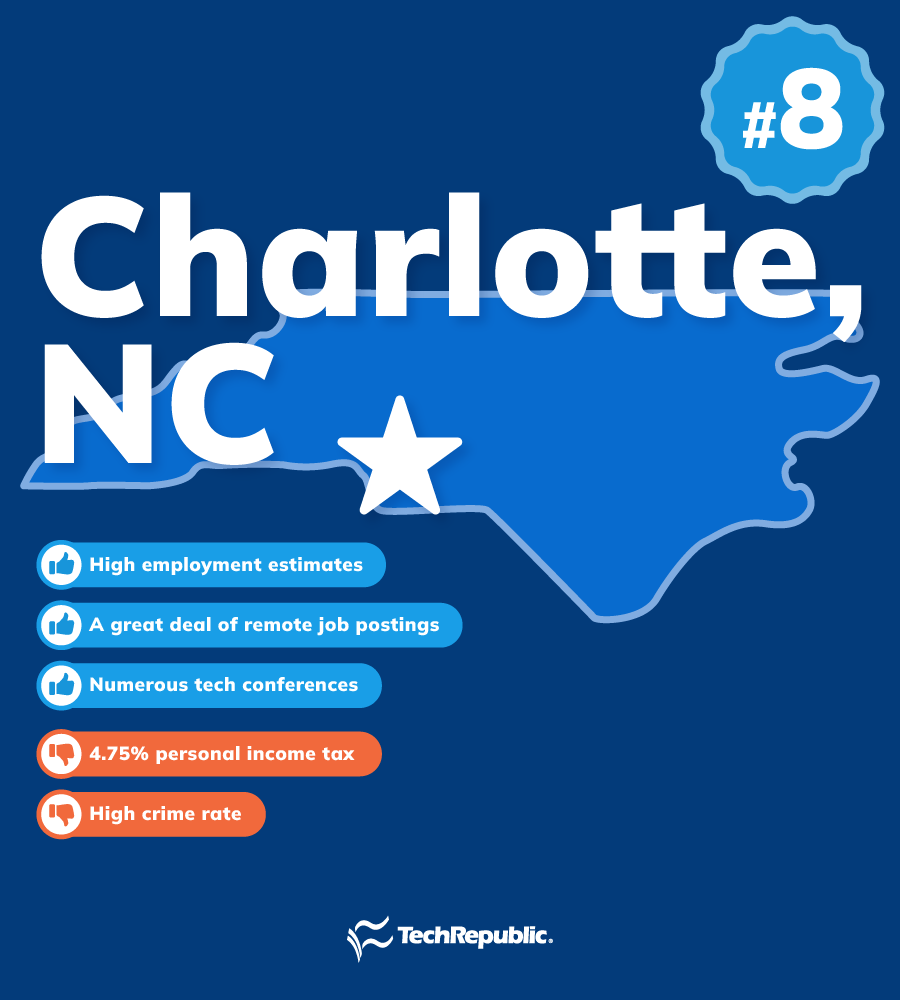
Rankings out of 60 U.S. metro areas
- Overall rank: 8
- Affordability: 20
- Job competitiveness: 1
- Quality of life: 38
Yet another southeastern top locale, the Queen City sits highly at the #8 spot on TechRepublic’s list. With an average annual salary of $105,000 in North Carolina, tech workers can live comfortably in Charlotte where the cost of living and housing prices are on the lower end.
Seeking a family-friendly location? Look no further. Charlotte has 242 public schools and 383 parks—including playgrounds and recreational centers—around its metro area.
Enriched with employment opportunities, for both on-site and remote work, tech employees will have no problem getting a good-paying job in the buzz city. In-person tech conferences are also available at least once a year.
Tech workers can get involved with various local chapters and affinity groups, such as:
- Charlotte Communications Society Chapter.
- Charlotte Computer Society Chapter.
- Charlotte Power and Energy Society Chapter.
However, like the Atlanta metro, the Crown Town can turn a tech employee’s smile upside down once the 4.75% personal income tax is deducted from their paycheck. In addition, safety and security could be a concern for residents. North Carolina has an above average rate of 405.1 violent crime offenses per 100,000.
7. Richmond, VA
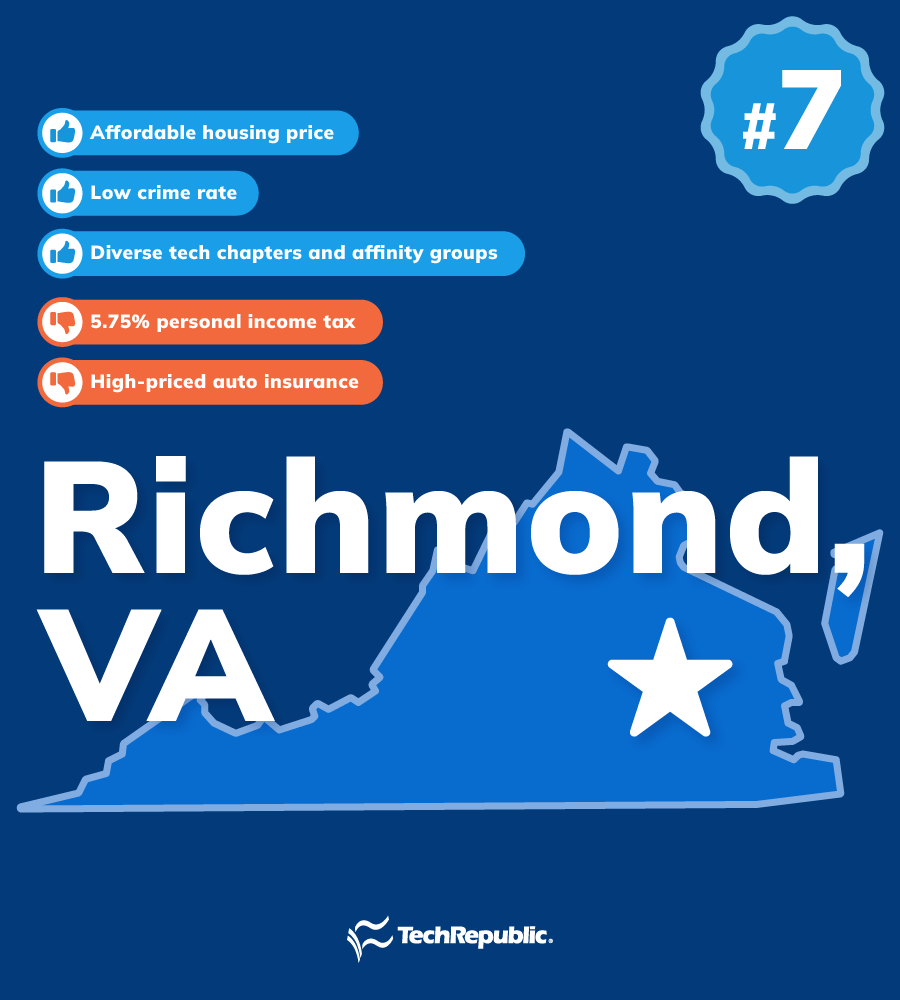
Rankings out of 60 U.S. metro areas
- Overall rank: 7
- Affordability: 20
- Job competitiveness: 10
- Quality of life: 6
The River City flows in at #7. With a low annual cost of living and housing costs of $217 per square foot, tech workers could delight in a comfortable lifestyle in RVA.
Thinking of building a family in the state for lovers? Virginia has a below average rate of 234 violent crime offenses per 100,000. This implies that residents can safely take advantage of the landscaped public parks. After all, a whopping 80% of the 1.3 million Richmond residents live within a 10-minute walk of a park.
A career in tech within the Richmond proper is also favorable, with more than 20,000 remote job postings. Furthermore, tech workers have a wide array of networking opportunities that they could look into. Women in STEM, for instance, could join the Richmond Women In Engineering Affinity Group.
Still, not everything is great in the Mother of States. A tech worker’s annual salary of $111,975 is subject to a 5.75% income tax rate, which is a significant pay cut. Furthermore, annual auto insurance roughly costs around $600.
6. Houston, TX
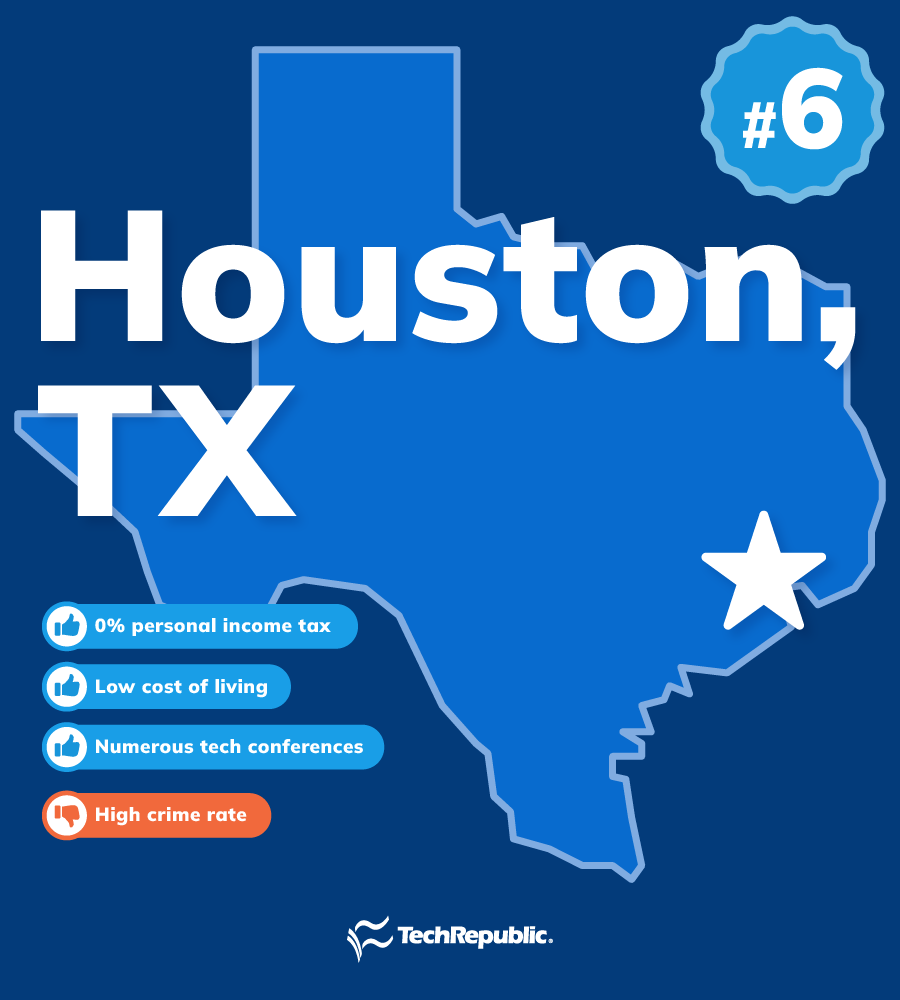
Rankings out of 60 U.S. metro areas
- Overall rank: 6
- Affordability: 2
- Job competitiveness: 9
- Quality of life: 22
It may come as no surprise that the Energy Capital of the World lands the #6 spot in TechRepublic’s list. The low cost of living and housing prices make the Houston metro area enticing for remote tech workers seeking to stretch their salaries.
With Texas’ 0% income tax rate, a tech worker’s annual salary of $99,753 could go a long way. From auto insurance to healthcare, basic needs are within reach in the Bayou City.
For families, Houston has 829 public schools. On top of that, the Space City has more than 660 accessible public parks and green spaces.
The Silicon Bayou has more than 24,000 remote job postings. Houston is home to numerous tech conferences and diverse networking involvements as well. Some of the tech groups are:
- Houston Young Professionals Affinity Group.
- Houston Nanotechnology Council Chapter.
- Houston Engineering in Medicine and Biology Society Chapter.
A major drawback of moving to the Beef State is safety and security concerns. Crime rates are somewhat higher in Texas than in other states, with a rate of 431.9 per 100,000.
5. Chicago, IL
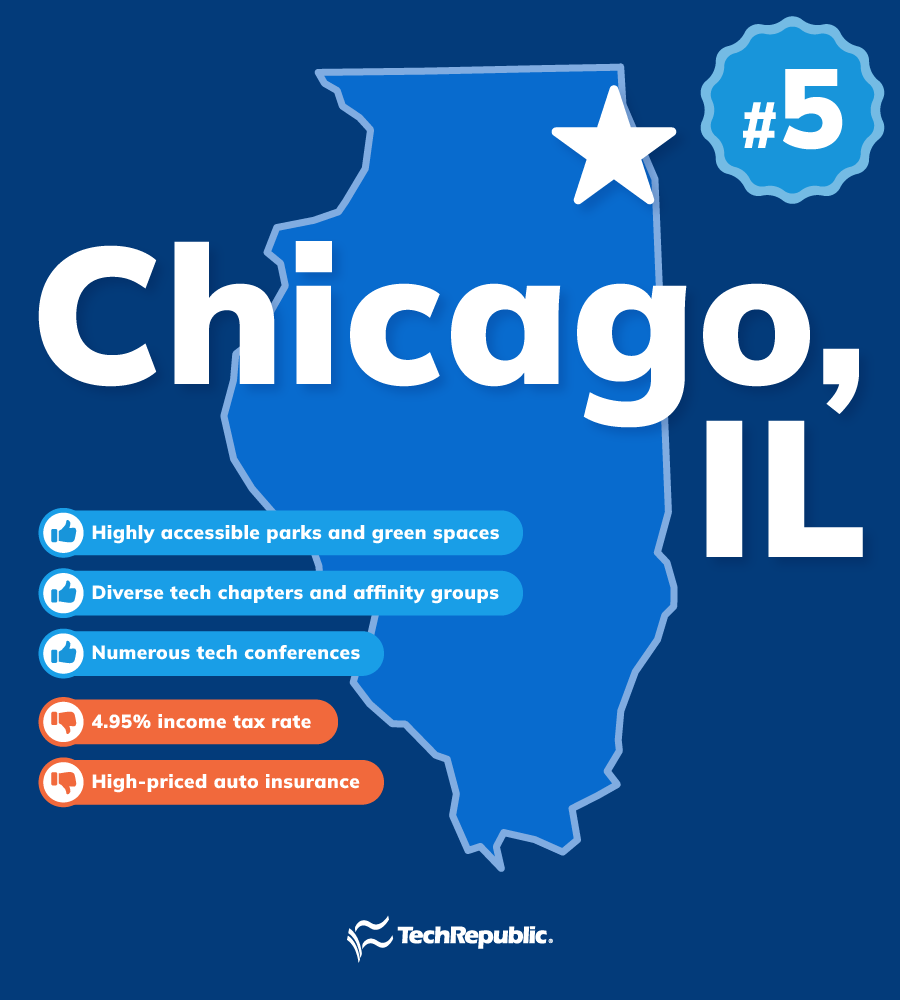
Rankings out of 60 U.S. metro areas
- Overall rank: 5
- Affordability: 29
- Job competitiveness: 4
- Quality of life: 6
The #5 spot goes to the City of Big Shoulders. With 98% of residents in the Chicago metro area living within a 10-minute walk of a park—and there are 1,249 parks and green spaces—remote tech workers can achieve a more holistic way of life.
For families, Chicago has 705 public schools. Residents can also feel safe and secure. Illinois has a lower-than-average rate of 287.3 violent crime offenses per 100,000.
Huge paychecks for tech workers in Illinois, which average around $95,989 annually, are far-stretched thanks to the affordable cost of living and housing prices.
The tech industry in Chicago is robust. The metro area has an employment estimate of 136,190. In terms of tech learning opportunities, Chicagoland offers various in-person tech conferences. Some events this year are:
- IEEE 4th Interdisciplinary Conference on Electrics and Computers.
- IEEE International Symposium on Product Compliance Engineering.
Moreover, tech workers could opt to join any of the various 20+ affinity groups around the metro area.
But not everything is likable in the Land of Lincoln. Despite the low cost of living, the salary of tech workers is subject to a 5.30% income tax rate deduction. Not to mention, auto insurance costs around $720 per year in Illinois.
4. Dallas-Fort Worth, TX
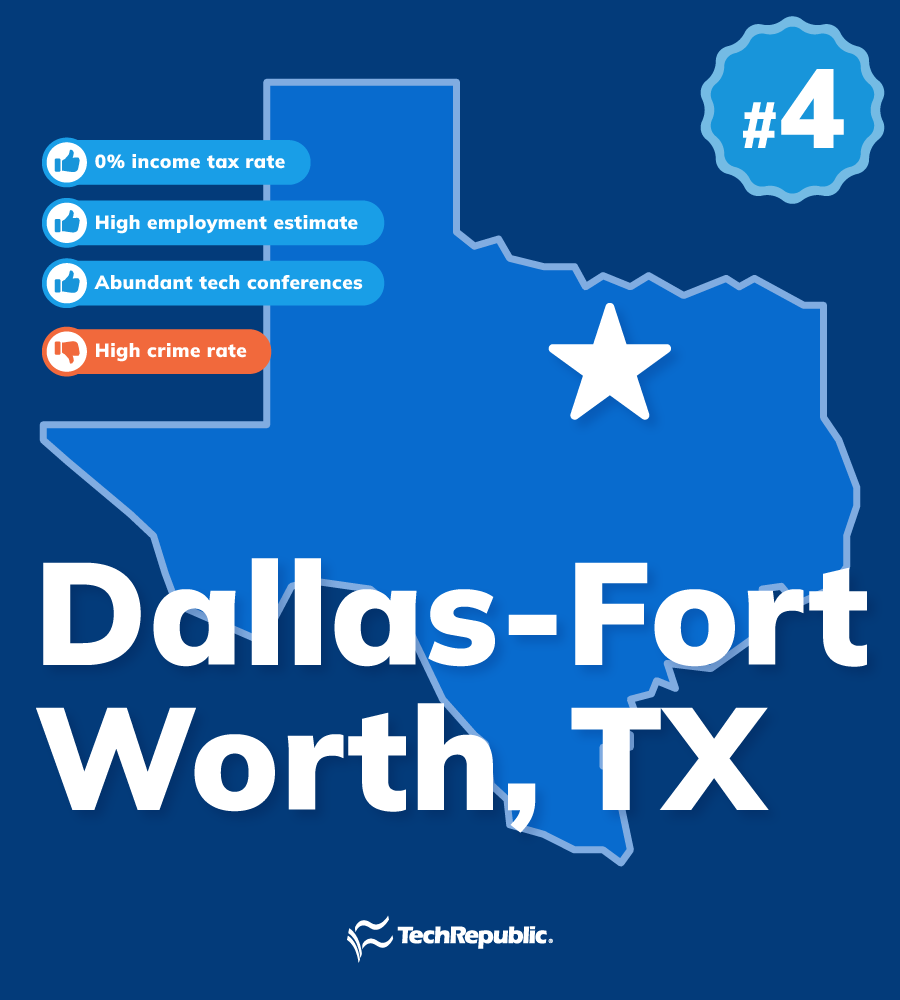
Rankings out of 60 U.S. metro areas
- Overall rank: 4
- Affordability: 10
- Job competitiveness: 4
- Quality of life: 16
In another one from The Lone Star State, the Dallas-Fort Worth metro area marks the #4 spot. Why rent when buying a home in this tech hub is seemingly attainable? After all, the average housing cost in the metroplex is on the low end. Housing prices per square foot are just $204 in Dallas.
The low cost of living and 0% personal income tax rate for residents offer more flexibility on the tech worker’s salary. With an average salary of $99,753 per year in Texas, tech workers can live an abundant lifestyle.
In terms of tech, DFW boasts 170,440 employment estimates. In addition, multiple tech conferences and networking events are hosted in the Dallas metro area to ensure that tech workers have access to learning opportunities. Some in-person tech conferences to watch out for are:
- IEEE 17th Dallas Circuits and Systems Conference (DCAS).
- IEEE International Conference on Mobility, Operations, Services and Technologies (MOST).
- IEEE 75th Electronic Components and Technology Conference (ECTC).
For families, Dallas-Fort Worth has 760 public schools. In addition, residents can take delight in a slam dunk of outdoor fun at the 474 parks in the metro area, most of which feature basketball hoops.
Nonetheless, residing in D-town has a downside. Safety and security are a major concern since Texas has a higher-than-average crime rate of 431.9 per 100,000.
3. Pittsburgh, PA

Rankings out of 60 U.S. metro areas
- Overall rank: 3
- Affordability: 2
- Job competitiveness: 10
- Quality of life: 6
The Steel City is third on TechRepublic’s list. With a housing cost of $154 per square foot, remote tech workers can find and purchase a comfortable home in this premiere technology hub.
Tech workers can reap the benefits of their hard work, thanks to a high annual salary of $101,792 in Pennsylvania. Safety and security are not much of a concern. The Keystone State has a below average rate of 279.9 violent crime offenses per 100,000.
Outdoor spaces are essential for remote workers who need a break from long hours of screen time. Since 14% of Pittsburgh’s land is used for parks and recreation, residents can delight in the 240 greeneries in the metro area.
Pittsburgh hosts a multitude of tech conferences and networking opportunities. Some tech chapters and affinity groups in this metro area include:
- Pittsburgh Young Professionals Affinity Group.
- Pittsburgh Women In Engineering Affinity Group.
- Pittsburgh Social Implications of Technology Society Chapter.
Unfortunately, it is not all wins for the City of Champions. Despite the affordability of the cost of living and housing, a tech worker’s paycheck has a 3.07% personal income tax deduction.
2. Milwaukee, WI
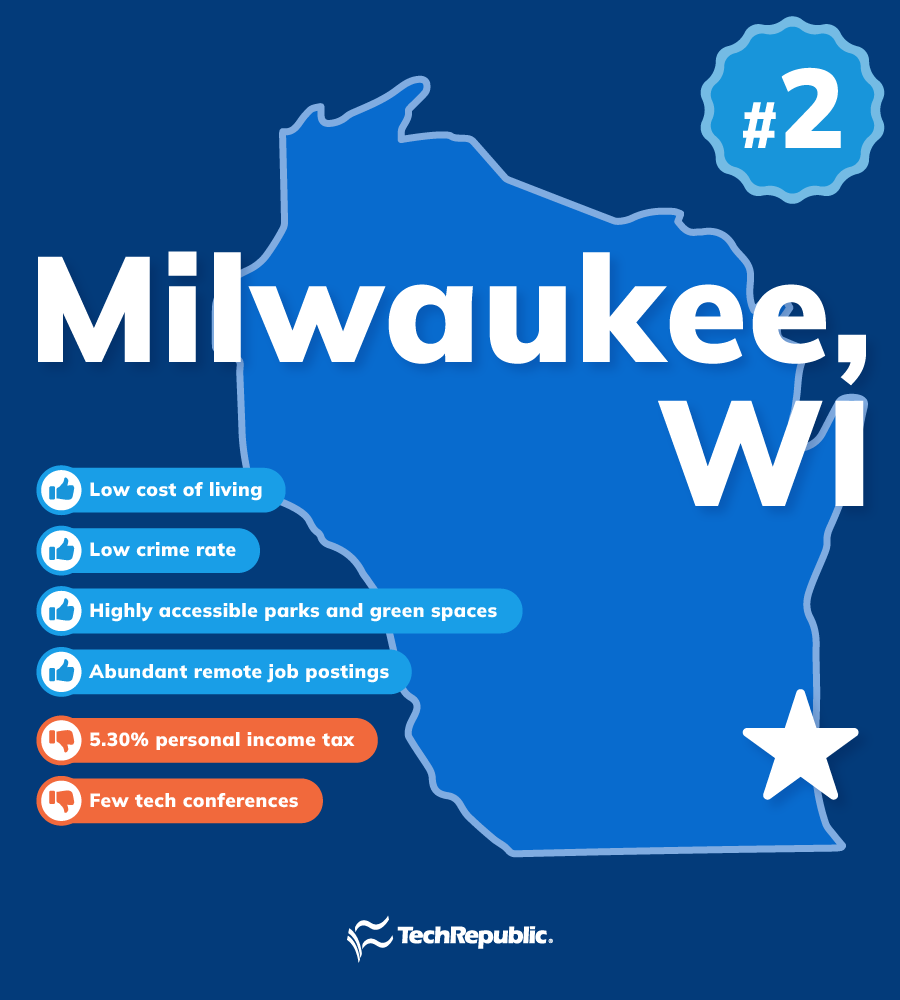
Rankings out of 60 U.S. metro areas
- Overall rank: 2
- Affordability: 2
- Job competitiveness: 10
- Quality of life: 4
The Dairy State enters the list with the Milwaukee metro area in the #2 spot. Tech workers looking for financial gain could consider moving to Cream City, where the cost of living and housing prices fall far below the national average.
Milwaukee has more than 62,000 remote job postings. For tech workers seeking professional interactions, there is a diverse range of networking opportunities to choose from, such as:
- Milwaukee Computer Society Chapter.
- Milwaukee Control Systems/Systems, Man and Cybernetics Society Chapter.
- Milwaukee Women In Engineering Affinity Group.
It is not just all work and no play in Milwaukee. For families, the Land of Festivals boasts 252 parks, which mostly include playgrounds, splash pads and basketball hoops. The educational outlook is robust as well in the Milwaukee metro area. It has 217 public schools.
In terms of safety and security, the crime rate in Wisconsin is 297 per 100,000, significantly lower than the national average.
It is not to say that everything is great in The Good Land. For tech workers seeking face-to-face learning opportunities, Milwaukee has a small number of in-person tech conferences. Moreover, high salaries in tech could be tight because of the 5.30% personal income tax in Wisconsin.
1. Philadelphia, PA
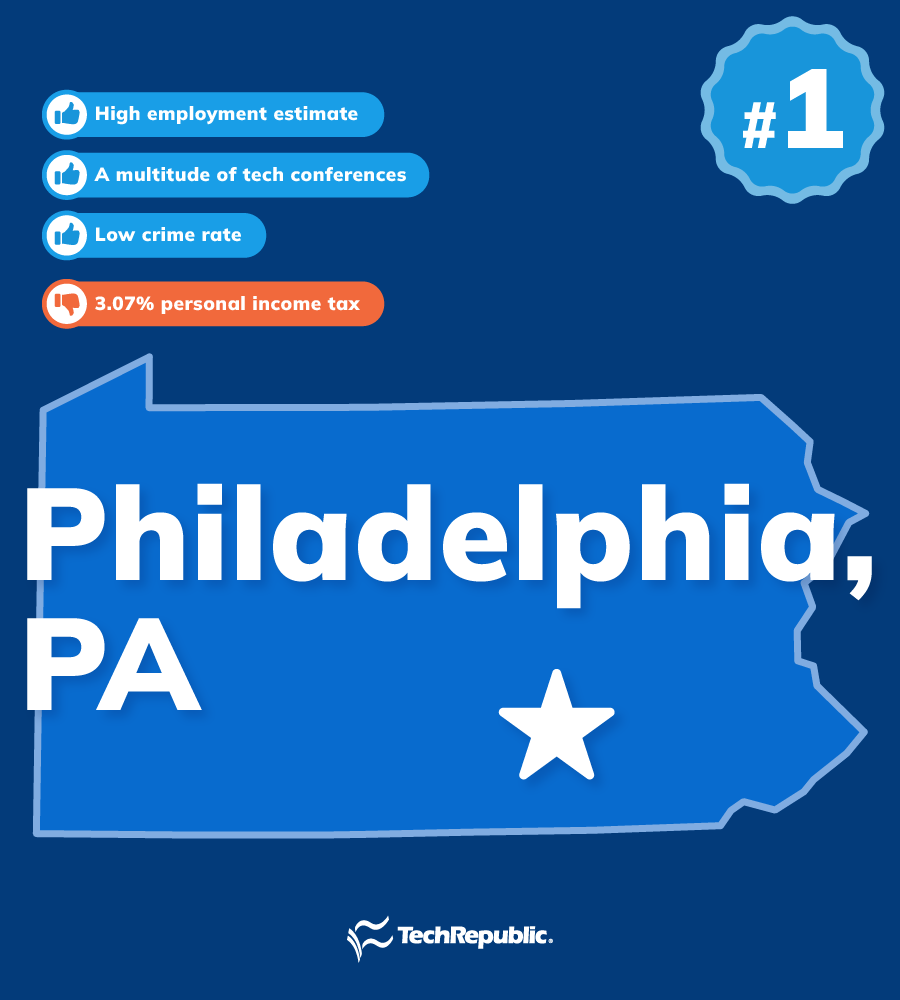
Rankings out of 60 U.S. metro areas
- Overall rank: 1
- Affordability: 9
- Job competitiveness: 1
- Quality of life: 1
Claiming the #1 spot in TechRepublic’s list is the Land of Brotherly Love. Tech workers residing in this metro area have plenty of tech employment opportunities, both on-site and remote. Philadelphia boasts 90,510 employment estimates.
In addition, Philadelphia hosts multiple tech conferences and networking involvement. Some in-person tech conferences to watch out for are:
- IEEE 8th International Conference on Fog and Edge Computing
- IEEE 24th International Symposium on Cluster, Cloud and Internet Computing.
- IEEE Energy Conversion Conference Congress and Exposition (ECCE).
With an annual salary of $101,792 in Pennsylvania, tech workers can take advantage of the low housing price in the Philadelphia metro area, which is just around $214 per square foot.
For families, Philly can be an ideal place to settle. From an educational angle, it has 376 public schools. In regards to relaxation and recreation, 95% of the 6.2 million residents live within a 10-minute walk of a park.
Residents enjoy a sense of security. Philadelphia has a rate of 316.2 violent crime offenses per 100,000, falling below the national average.
Although the cost of living is pretty low, the personal income tax rate of 3.07% significantly cuts the tech worker’s salary.
5 worst cities for remote tech workers
We’ve covered the best cities for remote tech workers. Now, let’s look at the worst.
Generally, the worst cities for remote tech workers are expensive and not tech-friendly. This implies high taxes, high cost of living, limited employment opportunities and absence of platforms for continuous learning.
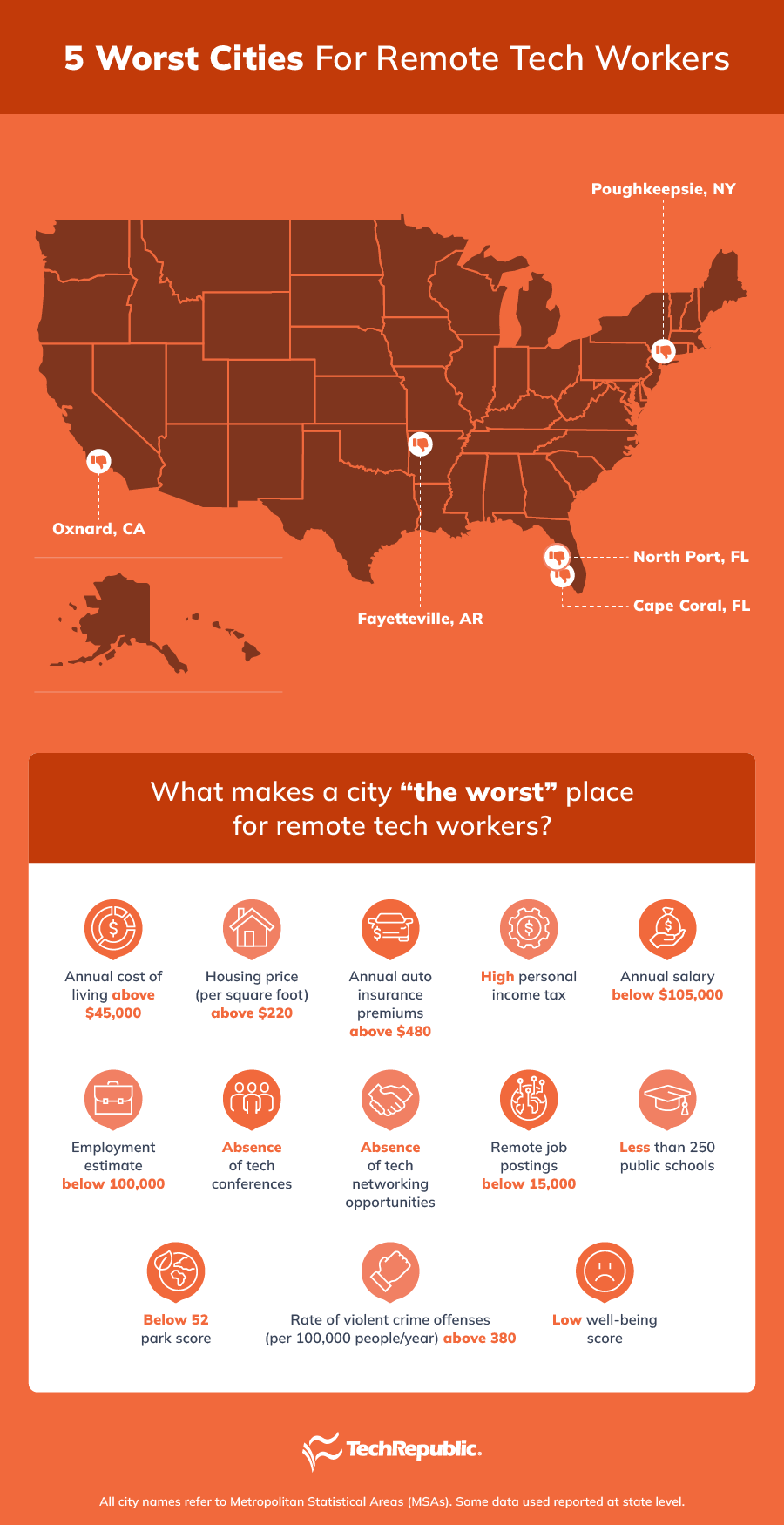
56. Fayetteville, AR
Rankings out of 60 U.S. metro areas
- Overall rank: 56
- Affordability: 10
- Job competitiveness: 53
- Quality of life: 59
Fayetteville from the Bear State sits at the #5 spot for worst cities. A tech worker’s annual salary of around $78,833 is subject to a 4.90% personal income tax deduction in Arkansas.
The number of tech opportunities is on a downward slope in the Land of Hills. Fayetteville has only 8,770 employment estimates. The metro area also lacks opportunities for tech networking.
For families, the city’s education system leaves something to be desired. Fayetteville has only 75 public schools. Safety and security are major concerns too. Arkansas’ rate of violent crime is 645.3 per 100,000, which is above the national average.
Nonetheless, the Fayetteville metro area takes pride in the low cost of living and housing prices. Fayetteville ranks 12th in cost of living and 24th in housing prices, with $203 per square foot.
57. Poughkeepsie, NY
Rankings out of 60 U.S. metro areas
- Overall rank: 57
- Affordability: 54
- Job competitiveness: 30
- Quality of life: 53
The Empire State enters the list with Poughkeepsie in the 4th spot. Purchasing a home in this metro area may not be ideal. Poughkeepsie ranks 55th in housing cost, with $337 per square foot. To add, tech salaries are subject to a 6.00% income tax rate in New York, which could limit its stretch.
For families, Poughkeepsie has only 36 public schools. Learning opportunities for tech workers are limited as well since Poughkeepsie does not offer a multitude of tech conferences and networking engagements.
A sense of security could be a concern. New York has an above average rate of 429.3 crime offenses per 100,000.
Still, there is no denying that the tech market in Poughkeepsie is highly competitive. It boasts more than 43,000 remote job postings. Equally, tech professionals in New York earn $111,128 per year.
58. Cape Coral, FL
Rankings out of 60 U.S. metro areas
- Overall rank: 58
- Affordability: 46
- Job competitiveness: 59
- Quality of life: 31
Another city from the Orange State, Cape Coral landed the third spot. Tech professionals looking for affordable homes may not find this city enticing. Cape Coral ranked 47th in housing cost, with $278 per square foot.
The number of tech jobs seems to be tight. Cape Coral has a 4,490 employment estimate. For tech workers looking for professional engagements, there are a few numbers of tech conferences and networking involvements.
Still, moving to the Flower State offers blooming factors. With a 0% income tax rate, tech workers can fully enjoy a huge annual paycheck of $75,305. Additionally, residents appreciate the sense of security and safety. Florida has a lower-than-average rate of 258.9 violent crime offenses per 100,000.
59. North Port, FL
Rankings out of 60 U.S. metro areas
- Overall rank: 59
- Affordability: 49
- Job Competitiveness: 59
- Quality of Life: 22
North Port in Florida is #2. Owning a house may be challenging because housing prices are around $301 per square foot. What’s more, auto insurance in Florida is around $1,092 per year.
Looking at North Port from a tech viewpoint, the metro area has only 5,560 employment estimates. Furthermore, North Port does not host a large number of tech conferences and networking events.
But there is still a beacon of light for tech workers considering living in the Sunshine State. Residents may worry less about safety and security because Florida has a 258.9 rate of violent crime offenses per 100,000, far below the national average. Furthermore, tech workers’ salaries are not subjected to a personal income tax rate.
60. Oxnard, CA
Rankings out of 60 U.S. metro areas
- Overall rank: 60
- Affordability: 58
- Job competitiveness: 49
- Quality of life: 45
In the #1 spot on TechRepublic’s list of worst cities is the Strawberry Capital of California. Oxnard ranks 59th in cost of living and 58th in housing prices, with $549 per square foot.
True to its name, the Golden State has sky-high taxes. With a 9.30% personal income tax rate, a tech worker’s salary of $104,671 is tightened.
Safety and security could be a major concern. California has an above average rate of 499.5 crime offenses per 100,000.
Oxnard’s tech market isn’t putting up very good stats. The metro area has only 7,790 employment estimates. Not to mention, the metro area has few tech conferences and networking opportunities.
Nonetheless, there is something sweet to find when moving to the Land of Milk and Honey. For families, Oxnard has over 101 public schools. Tech professionals also earn around $104,671 per year in California.
Methodology
To determine the best and worst cities for remote tech workers, TechRepublic compared 60 U.S. metro areas across three key dimensions: affordability, job competitiveness and quality of life.
Each metro area’s weighted average was determined across 13 metrics to measure its overall score, and the resulting scores were used to rank the cities in the list. Each metric was scored either 0, 0.25, 0.5, 0.75 or 1, with a score of 1 representing the most favorable conditions for tech workers. Some data used were reported at the state level.
Data collected were based on the cost of living, median listing price per square foot, annual car insurance premiums and income tax rate. These factors were weighed to determine the overall affordability score of each metro area.
Data collected were based on the annual median salary, employment, remote job postings and presence of tech conferences and networking opportunities. These factors were weighed to determine the overall job competitiveness score of each metro area.
Data collected were based on the number of public schools, park scores, rate of violent crime offenses per 100,000 people/year, and well-being score. These factors were weighed to determine the overall quality of life score of each metro area.
[ad_2]
Source Credit



